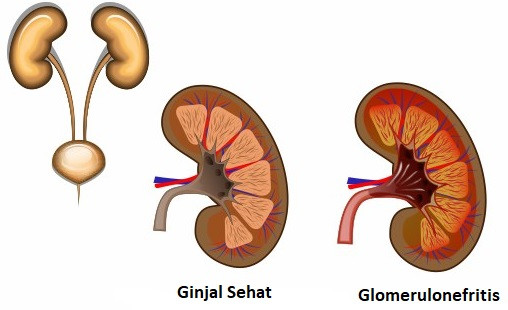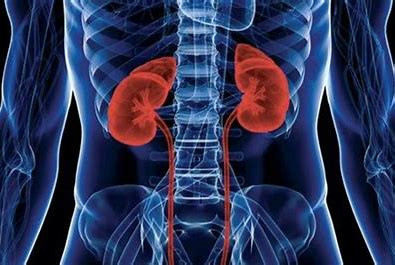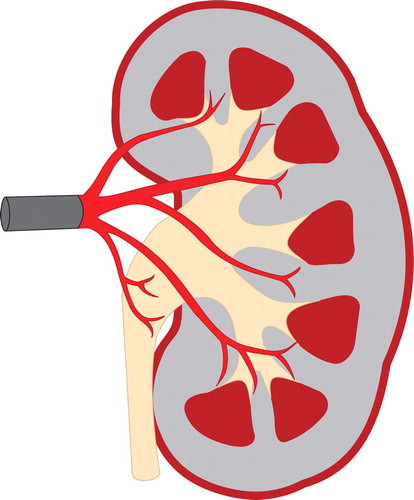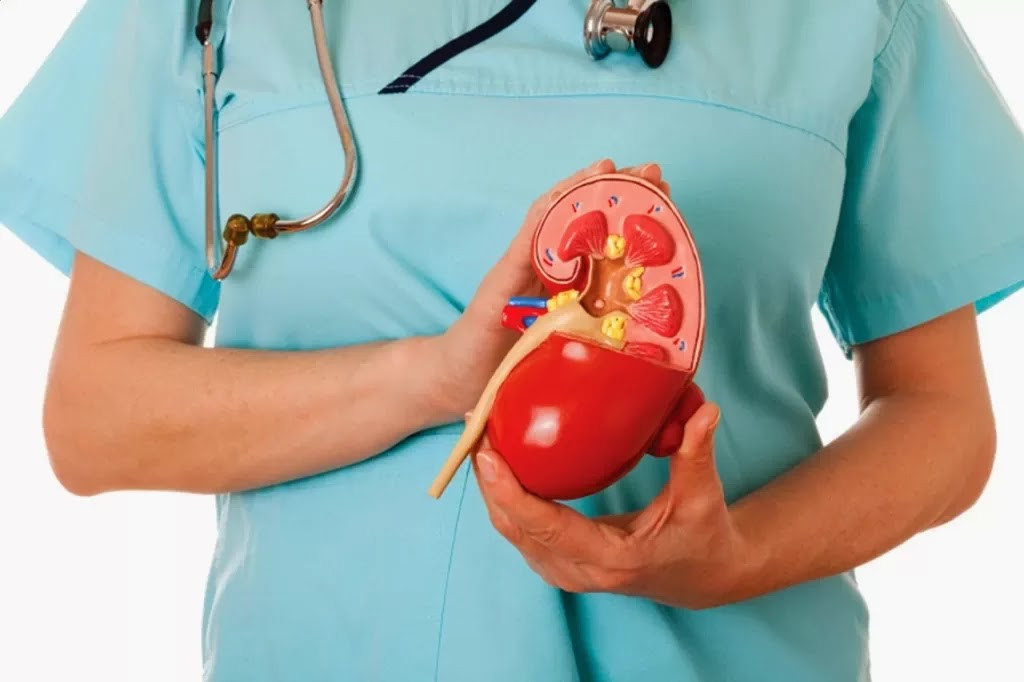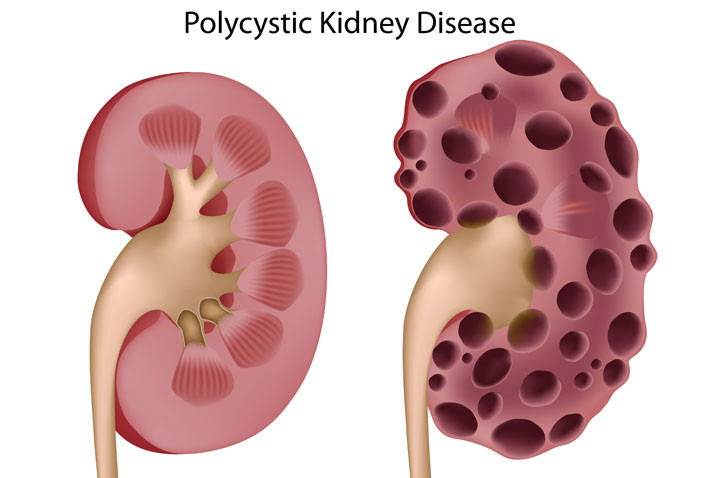Definisi
Glomerulonefritis adalah penyakit ginjal yang terjadi karena peradangan jaringan glomerulus di dalam ginjal. Glomerulus adalah struktur dalam ginjal yang berfungsi untuk menyaring darah, dan mengeluarkan kelebihan cairan serta zat sampah yang dikumpulkan sebagai urine. Glomerulus berada di bagian dalam ginjal dan tidak dapat dilihat dengan mata telanjang.
Glomerulonefritis dapat terjadi tiba-tiba (akut) atau bertahap dan berlangsung lama (kronis). Glomerulonefritis akut ditandai dengan munculnya gejala secara tiba-tiba dan keluhan dapat memberat dalam waktu cepat. Peradangan pada glomerulus dapat terjadi dengan sendirinya atau karena efek samping dari suatu penyakit lain.
Sementara itu, peradangan dalam jangka waktu lama pada glomerulus akan menyebabkan kerusakan ginjal. Harus dilakukan penanganan segera pada glomerulonefritis akut untuk menghindari komplikasi berat ke depannya.
Penyebab
Banyak kondisi yang dapat menyebabkan glomerulonefritis akut. Peradangan yang terjadi di jaringan glomerulus dapat terjadi karena beragam hal, seperti karena kondisi medis lain atau gangguan ginjal itu sendiri. Beberapa penyebab glomerulonefritis akut tersering adalah:
1. Infeksi
Infeksi yang paling sering menyebabkan glomerulonefritis akut adalah riwayat infeksi bakteri Streptococcus. Jenis infeksi yang terjadi adalah infeksi saluran pernapasan atas dan infeksi kulit. Infeksi pada katup jantung (endocarditis) juga dapat menyebabkan penyakit ini Glomerulonefritis baru akan terjadi 1 - 3 minggu setelah infeksi akut bakteri tersebut. Infeksi juga dapat disebabkan mikroorganisme lain seperti:
- Virus hepatitis B
- Virus hepatitis C
- HIV
- Bakteri staphylococcus, dll.
2. Penyakit Autoimun
Penyakit autoimun adalah penyakit yang terjadi ketika sistem kekebalan tubuh menyerang jaringan tubuh yang sehat. Contoh penyakit autoimun adalah:
- Lupus sistemik eritematosa (SLE), penyakit lupus tersering yang menyebabkan peradangan dan kerusakan jaringan yang luas
- Sindrom Goodpasture, sistem imun tubuh menyerang paru dan ginjal
- IgA nefropati atau penyakit Berger, gangguan ginjal yang terjadi ketika terjadi penumpukan antibodi IgA dalam ginjal
3. Vaskulitis
Vaskulitis adalah peradangan pembuluh darah. Contoh penyakit yang menyebabkan glomerulonefritis akut adalah poliarteritis, kondisi gangguan aliran pembuluh darah berukuran sedang yang menyuplai darah ke:
- Kulit
- Sistem saraf
- Sendi
- Ginjal
- Saluran cerna, dll.
Kondisi Sklerotik
Kondisi ini terjadi ketika penyakit lain menyebabkan kerusakan glomerulus yang menyebabkan fungsi ginjal memburuk. Beberapa di antaranya adalah:
- Tekanan darah tinggi
- Nefropati diabetik atau penurunan fungsi ginjal karena penyakit diabetes melitus
- Glomerulosklerosis, perlukaan pada glomerulus ginjal
Faktor Risiko
Glomerulonefritis akut dapat terjadi pada semua usia namun lebih sering dialami oleh anak. Biasanya kondisi akut dari penyakit ini menyerang anak yang berusia 5 - 15 tahun, walaupun penyakit ini dapat mengenai siapa saja. Risiko terjadinya penyakit meningkat jika sebelumnya mengalami infeksi yang berkaitan dengan bakteri streptococcus, seperti nyeri tenggorokan dan infeksi kulit.
Gejala
Gejala glomerulonefritis akut biasanya terjadi dalam waktu cepat. Berbeda dengan kondisi kronis yang terjadi bertahap dan dalam jangka panjang. Gejala dapat muncul hanya 3 minggu setelah infeksi sebelumnya. Beberapa gejala yang dapat dirasakan pada glomerulonefritis akut adalah:
- Warna urine pink atau kecoklatan akibat adanya darah di urine (hematuria)
- Urin berbusa seperti busa cucian piring karena kelebihan protein pada urine (proteinuria)
- Tekanan darah tinggi (hipertensi)
- Penumpukan cairan yang ditandai dengan bengkak di wajah, tangan, kaki, dan perut (edema)
- Buang air kecil lebih jarang dari biasanya atau jumlah urine berkurang
Beberapa gejala lain yang kurang spesifik namun dapat terjadi pada glomerulonefritis akut adalah:
- Mual dan muntah
- Nyeri kepala
- Kram otot
- Kelelahan
- Sesak napas akibat penumpukan cairan di paru-paru
- Penurunan nafsu makan
- Kulit kering dan gatal
Diagnosis
Diagnosis glomerulonefritis akut ditegakkan dengan wawancara gejala yang dialami, lalu dilanjutkan pemeriksaan fisik. Pada pemeriksaan fisik dapat ditemukan tekanan darah tinggi, pembengkakan terutama di wajah, dan perubahan pada urine. Dokter juga akan mencari tanda kelebihan cairan yang lain pada tubuh, serta bila ada tanda-tanda infeksi pada pasien.
Glomerulonefritis akut juga dapat ditemukan tiba-tiba dari hasil pemeriksaan urine tanpa adanya gejala spesifik pada pasien. Oleh karena itu, dokter akan melakukan pemeriksaan penunjang untuk memastikan kondisi pasien dengan:
1. Urinalisis
Urinalisis adalah pemeriksaan urine untuk melihat adanya darah, protein, dan kandungan urin. Pemeriksaan urine dapat dilakukan selama 24 jam.
2. Pemeriksaan darah
Terutama dilakukan untuk melihat kandungan urea, kreatinin, elektrolit, serta sistem komplemen di dalam darah. Pemeriksaan ini berperan dalam melihat fungsi ginjal serta aktivitas sistem imun di dalam tubuh.
3. Pemeriksaan radiologi
Pada beberapa kasus diperlukan pemeriksaan radiologi seperti X-ray dada, USG ginjal, hingga CT scan. Dari pemeriksaan radiologi, bisa dilihat bila bentuk ginjal normal atau tidak.
4. Biopsi ginjal
Pemeriksaan ini jarang dilakukan karena glomerulonefritis akut dapat ditegakkan dari gejala klinis. Pada pemeriksaan biopsi ginjal, sampel jaringan ginjal akan diambil, lalu diperiksa lebih detail di bawah mikroskop. Dari pemeriksaan ini juga dapat ditemukan seberapa parah kerusakan jaringan glomerulus.
Tata Laksana
Tata laksana glomerulonefritis akut biasanya bersifat suportif. Bila glomerulonefritis akut terjadi karena penyakit lain, yang perlu ditangani dahulu adalah penyakit yang mendasari tersebut. Hal ini terjadi karena tidak ada penanganan spesifik yang dapat dilakukan. Tujuan dari terapi glomerulonefritis adalah untuk mencegah kerusakan fungsi ginjal lebih lanjut. Bahkan pada beberapa kasus, glomerulonefritis dapat sembuh sendiri. Tata laksana akan diberikan dokter untuk mengurangi keparahan penyakit dan menangani gejala yang dialami.
Beberapa obat yang dapat diberikan dokter untuk glomerulonefritis akut adalah:
- Antibiotik untuk mencegah penyebaran infeksi bakteri di dalam tubuh, walau antibiotik tidak akan mencegah terjadinya glomerulonefritis.
- Diuretik adalah obat yang berguna untuk meningkatkan pengeluaran produksi cairan keluar tubuh, sehingga gejala pembengkakan tubuh dan peningkatan tekanan darah dapat membaik.
- Obat penurun tekanan darah.
- Kortikosteroid, digunakan bila glomerulonefritis akut terjadi karena penyakit autoimun. Obat ini dapat mengurangi peradangan di ginjal.
- Vasodilator atau obat yang melebarkan pembuluh darah, digunakan untuk kasus hipertensi berat atau bila ada dugaan kerusakan pada otak (ensefalopati).
Dokter akan meminta Anda untuk mengurangi konsumsi garam dan cairan terutama bila penyakit ini sedang dalam fase akut atau baru saja terjadi, untuk mengontrol gejala pembengkakan dan hipertensi. Pemeriksaan tekanan darah akan rutin dilakukan, serta memonitor urine yang dikeluarkan selama 24 jam. Anda akan diminta untuk istirahat total (bed rest) atau dirawat di rumah sakit hingga gejala peradangan berkurang.
Bila Anda sudah mengalami gagal ginjal, dokter akan menyarankan terapi cuci darah atau dialisis. Prosedur ini menggunakan mesin yang bersifat sebagai pengganti ginjal dan menyaring darah dalam tubuh. Bila kasus sudah cukup berat dan terapi dialisis tidak dapat dilakukan, dokter dapat melakukan operasi transplantasi ginjal.
Komplikasi
Komplikasi yang bisa terjadi akibat glomerulonefritis itu bervariasi dan tergantung pada penanganan yang sudah dilakukan. Komplikasi paling berat dari penyakit ini adalah kematian yang banyak terjadi pada pasien anak. Glomerulonefritis akut juga dapat menyebabkan gangguan di organ tubuh lainnya sebagai akibat dari penumpukan limbah metabolisme di darah, tekanan darah tinggi, hilangnya sel darah merah dan protein yang ikut keluar bersama urine.
Beberapa komplikasi tersebut adalah:
- Gagal ginjal akut, yaitu perburukan fungsi ginjal yang terjadi tiba-tiba dalam waktu cepat. Bila berat, dapat memerlukan penanganan cuci darah (dialisis).
- Gagal ginjal kronik, kondisi yang bisa berkembang menjadi kematian ginjal dalam waktu cepat. Ginjal yang sudah tidak dapat bekerja dengan baik akan membutuhkan cuci darah atau transplantasi ginjal.
- Hipertensi atau peningkatan tekanan darah karena kerusakan glomerulus berat.
- Ketidakseimbangan elektrolit di dalam darah.
- Kelainan urine yang dapat bertahan lama.
- Retinopati hipertensi, peningkatan tekanan darah yang menyebabkan gangguan mata.
Pencegahan
Tidak ada pencegahan spesifik dari glomerulonefritis akut. Meski begitu, beberapa hal yang dapat diperhatikan lebih lanjut sebagai bentuk pencegahan adalah:
- Segera berobat bila mengalami infeksi bakteri streptokokus seperti sakit tenggorokan atau infeksi kulit.
- Bila aktif secara seksual, praktikkan hubungan seksual yang aman untuk mencegah infeksi saluran kemih.
- Mengontrol tekanan darah.
- Mengontrol gula darah.
- Berhenti merokok.
- Menjaga berat badan ideal.
Kapan Harus ke Dokter?
Segera periksakan ke dokter bila Anda mengalami gejala di atas. Lakukan pemeriksaan kesehatan rutin karena kondisi juga dapat terjadi sebelum ada gejala yang spesifik. Berobatlah dengan tuntas bila sebelumnya mengalami infeksi bakteri atau virus. Segera konsultasikan ke dokter bila anak Anda juga mengalami demam tinggi, perubahan pada urin, dan pembengkakan tubuh yang tiba-tiba terjadi.
Mau tahu informasi seputar penyakit lainnya? Cek di sini, ya!
- dr Hanifa Rahma
Parmar, M. (2020). Acute Glomerulonefritis: Practice Essentials, Background, Pathophysiology. Emedicine.medscape.com. Retrieved 9 July 2022, from https://emedicine.medscape.com/article/239278-overview#showall.
Glomerulonefritis - Symptoms and causes. Mayo Clinic. (2022). Retrieved 9 July 2022, from https://www.mayoclinic.org/diseases-conditions/glomerulonephritis/symptoms-causes/syc-20355705.
What is Glomerulonefritis?. National Kidney Foundation. (2022). Retrieved 9 July 2022, from https://www.kidney.org/atoz/content/glomerul.
Glomerulonefritis. nhs.uk. (2019). Retrieved 9 July 2022, from https://www.nhs.uk/conditions/glomerulonephritis/.
Moore, J. (2021). What to Know About Glomerulonefritis. WebMD. Retrieved 9 July 2022, from https://www.webmd.com/a-to-z-guides/what-to-know-glomerulonephritis.
Case-Lo, C. (2017). Glomerulonefritis: Causes, Symptoms, and Treatment. Healthline. Retrieved 9 July 2022, from https://www.healthline.com/health/glomerulonephritis#.


